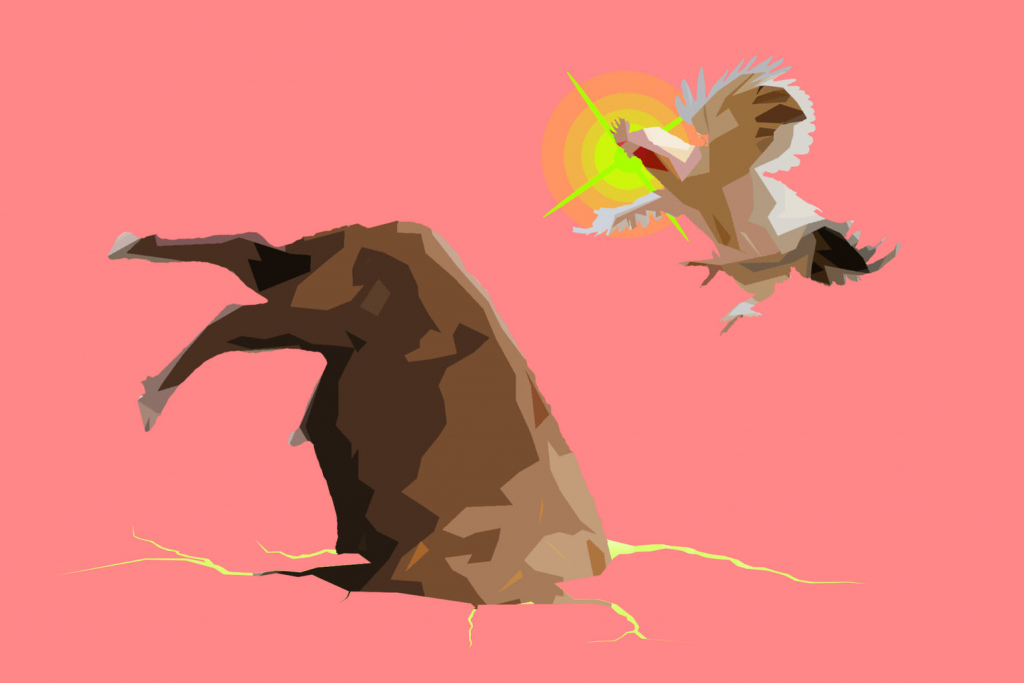If you’re at a crossroads in life and you’re looking for direction, this week’s idiom may help give some guidance. If you’re sick of feeling like a cog in the machine and considering flexing your entrepreneurial spirit, then consider keikou-gyugo as a guiding metaphor. Or don’t, we can’t tell you what to do.
Keikou-gyugo (鶏口牛後)
Meaning: Better the beak of a rooster than the rump of a bull, better to be a large fish in a small pond than a small fish in a big pond, better to be the head of a dog than the tail of a lion, better to be the leader of a small group than a subordinate in a large organization, anything but a small cog in a large wheel.
Literal translation and kanji breakdown: 鶏口 (Keikou; chicken/rooster mouth) is shorthand for 鶏の口 (niwatori no kuchi; the mouth of a chicken), while 牛後 (gyugo; cattle behind) serves as a more polite form of 牛のお尻 (ushi no oshiri, cattle’s butt). Although 鶏 (niwatori) and 牛 (ushi) can be male or female, the expression is most often translated as rooster and bull rather than chicken and cow.
Keikou-gyugo: The Origins
To get to the source of this expression, we travel back to ancient China’s Warring States period (~403BC to 221 BC). Political strategist Su Qin sought to create a vertical alliance between the six states of Yan, Zhao, Han, Wei, Qi and Chu against the mighty Qin State. King Xuan of Han was particularly reluctant to join, so Su Qin appealed to his pride, stating that if he becomes a vassal of the Qin Dynasty, it would be no better than being the ass of a cow. Better instead to be the beak of a rooster, even if comparatively small. This gave King Xuan the push he needed to unite with the other states and the rest is, as they say, history. (Spoiler alert: the alliance didn’t last that long. As for Su Quin, after a series of dramatic incidents including infidelity and assassination attempts, he was posthumously tried for treason and his corpse was torn in pieces in the town square.)
Keikou-gyugo: Related Expressions
鯛の尾より鰯の頭 Tai no o yori iwashi no atama Better to be the head of a sardine than the tail of a sea bream.
芋頭でも頭は頭 Imogashira demo atama wa atama. A head is still a head, even if it’s the head of a taro.
腐っても鯛 Kusattemo tai Even if it’s rotten it’s still a sea bream, a diamond on a dunghill is still a diamond.
大鳥の尾より小鳥の頭 Otori no o yori kotori no atama Better the head of a small bird than the tail of a large one.
箸と主とは太いがいい Hashi to nushi to wa futoi ga ii (antonym) The thicker the chopsticks and the lord the better, your master should be rich and dependable.
寄らば大樹の陰 Yoraba taju no kage (antonym) Look for a big tree when you want shelter, serve the powerful for your own good.
犬になるなら大家の犬になれ Inu ni naru nara, oya no inu ni nare (antonym) If you’re going to be a dog, becomes the landlord’s dog, if you’re going to have a master then choose a rich and reliable one.
Using “keikou-gyugo” in a sentence
This isn’t going to spontaneously appear in conversation much unless there’s talk of job searching and changing careers. It does, on the other hand, appear on work advice websites and columns. And even though it’s not the right advice for everyone, it does help offer some perspective for someone who’s not sure how to take the next step forward.
鶏口牛後の思いを胸に、起業しました。Keikou-gyugo no omoi wo mune ni, kigyo shimashita. I thought having creative control was better than being a cog in the wheel, so I started my own company.
なんでもかんでも鶏口牛後というわけではない、大企業も悪くない。Nandemokandemo keikou-gyugo to iu wake de wa nai, daikigyo mo warukunai. Being a big fish in a small pond isn’t a one-size-fits-all approach, big companies aren’t bad either.
鶏口牛後の気持ちでベンチャー企業の社長の座を狙う。Keikou-gyugo no kimochi de venture kigyo no shacho wo nerau. I’ve set my sights on becoming the president of a venture company.
大企業に勤めるも思うように出世が望めず、鶏口牛後の精神で転職する。Daikigyo ni tsutomeru mo omou you ni shusse ga nozomezu, keikou-gyugo no seishin de tenshoku suru. I worked for a large company but couldn’t rise to the top as hoped, so I’ve decided to find a job at a smaller company.
Want more? Follow our weekly Yojijukugo Japanese Idiom series, published every Friday. Learn the meaning of “fuminfukyu” here, “jimonjitou” here and “mikkatenka” here.








